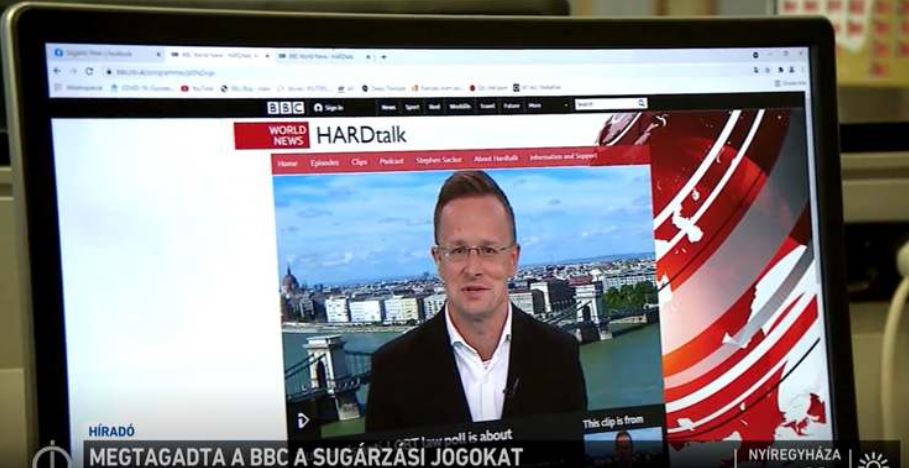By: V4 Agency
BBC has refused to allow the Hungarian public media to broadcast the full interview with Hungarian Foreign Minister Peter Szijjarto on BBC’s show Hard Talk. Hirado.hu, the news portal of the Hungarian public service media recalls that in the interview, the BBC’s host “attacked the Hungarian government in well-known ways and on well-known issues,” such as the rule of law, the EU funds, the LGBTQ question, the spy software and NGOs. The Hungarian foreign minister gave an objective and detailed response to all questions, outlining the Hungarian position. “We can only guess why the BBC does not want Hungarian viewers to see the interview,” the news programme of the Hungarian public M1 channel reported.
Balazs Bende, a senior foreign policy journalist of the Hungarian public media, said after the broadcast of the interview: “let’s put it this way: the BBC was commissioned by the international lobby to put Foreign Minister Peter Szijjarto in a very difficult (…), uncomfortable position.”
The half-hour conversation caused a huge media stir in Hungary, with the overall impression being that the Hungarian FM not only stood his ground responding to the questions designed to squeeze him into a corner but also “lashed out at” the BBC and “put up a good fight.”
The Hungarian public M1 channel wanted to acquire the broadcasting rights of the programme but the BBC “refused it after long wrangling.” The Hungarian public media says that the BBC must have been unhappy with the interview, which did not achieve the intended goal.
Balazs Bende says “the BBC felt it would have been embarrassing to let Hungary show it to everyone. We have the feeling that this is why the BBC, after a week of deliberation, head-scratching and exchanging messages replied that they did not have the means to distribute this particular episode internationally at the moment. So we won’t get it.” Mr Bende added that the refusal is completely unusual for the British broadcaster as the exchange of news and news programmes is standard practice; the Hungarian public media pays for them.
The journalist sees a tendency in the Western press’s refusal to pass on footage which has become sensitive to society, such as migration or LGBTQ issues, especially when in Hungary they could be used to show that the West is having problems with those issues.
Last week, the Swedish public television denied the Hungarian public media the right to broadcast recordings of a case of two children who were shot and killed on a playground near Stockholm.
